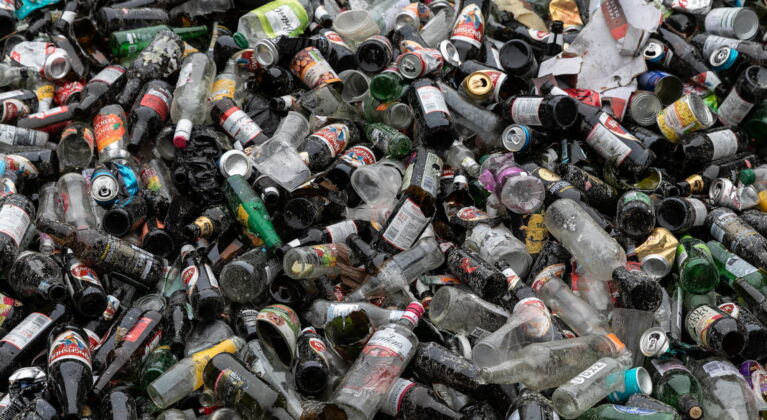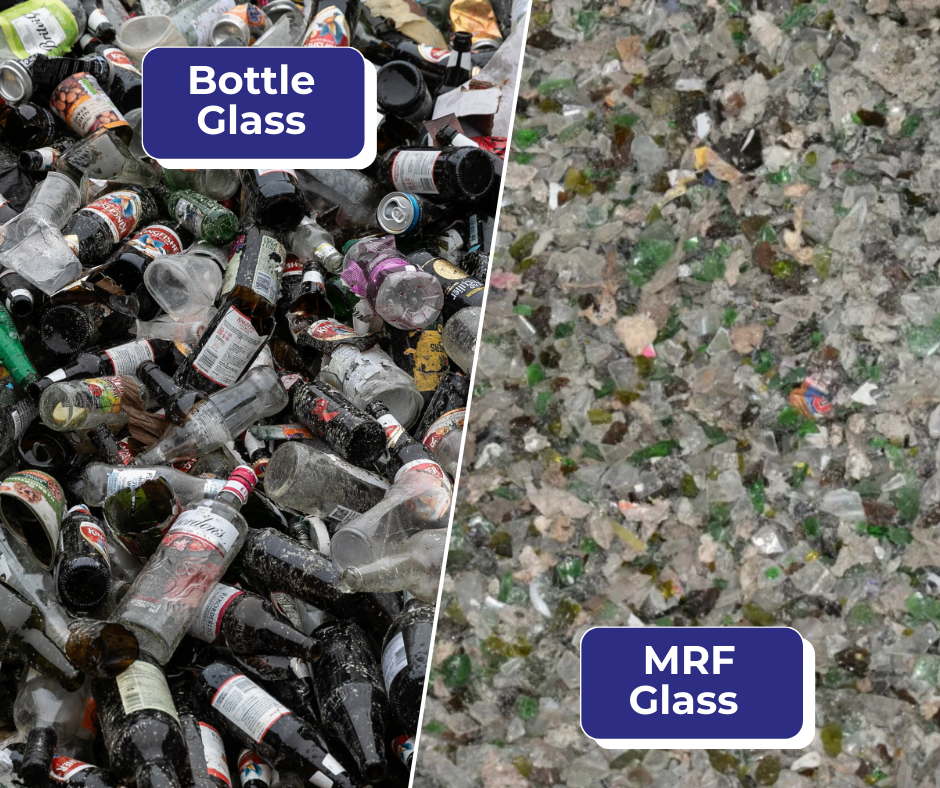

J&B Recycling Knowledge

Recycle Week 2025: Recycling Glass
Glass is one of the oldest packaging materials still in use today, and for good reason. Strong, versatile and endlessly recyclable, it remains a staple in households and businesses across the UK. From drinks bottles and food jars to windows and construction materials, glass is all around us. But not all glass is the same, and the way it is collected and recycled depends on the type.
At J&B Recycling, we process large volumes of glass at our Materials Recycling Facility (MRF), helping local authorities and businesses turn waste glass back into useful products. By keeping glass in circulation, we reduce the need for raw materials, cut carbon emissions, and support a circular economy where nothing goes to waste.
Glass bottles and jars
Household recycling collections typically include glass bottles and jars - think wine bottles, sauce jars, or jam jars. These items are perfect for recycling because they can be endlessly reprocessed into new containers without any loss of quality.
Once collected, bottles and jars are colour-sorted and crushed into a material known as cullet. This cullet is then melted down and used to manufacture new glass products, usually more bottles and jars. In fact, recycled glass is a key ingredient in the production of new containers, with many manufacturers using high percentages of cullet in their processes.
The benefits are significant. Recycling glass saves energy because cullet melts at a lower temperature than raw materials. For every tonne of glass recycled, over a tonne of natural resources such as sand, soda ash, and limestone is saved, along with around 300 kg of CO₂ emissions.
Glass bottles from businesses
It’s not just households that produce glass waste. Businesses - especially pubs, clubs and restaurants - generate huge volumes of glass bottles. These are collected separately in large containers, which means they are typically cleaner and less contaminated than household glass.
Because this material is sorted at source, it is highly valuable to reprocessors. Clean bottles collected from businesses can go directly into high-quality recycling streams, ensuring they are turned back into bottles and jars rather than being downcycled into secondary uses.
At J&B Recycling, we work with businesses of all sizes to collect, sort and process glass efficiently. By keeping this material separate and contamination-free, we help ensure it goes back into the manufacture of new containers, supporting both the recycling industry and the hospitality sector’s sustainability goals.
Glass collected at the MRF
Not all glass is collected separately at the kerbside. In many areas, it arrives mixed in with other recyclables at our MRF. This is known as MRF glass.
When this happens, the glass often breaks into small pieces during collection and transport. Although it cannot always be recycled back into bottles, it is far from wasted. Instead, MRF glass is cleaned, graded and used in a wide range of secondary applications. It can be turned into aggregate for road building, used in construction materials such as concrete blocks, or even used as a base layer for sports pitches.
This approach ensures that even when glass cannot go back into bottles, it still plays a valuable role in reducing demand for virgin materials in other industries.
Flat glass and plate glass
Flat or plate glass - such as windows, mirrors, and glass furniture - is a different challenge altogether. Unlike bottles and jars, flat glass contains additives and treatments that make it more durable, but also harder to recycle in traditional glass remanufacturing.
This type of glass should not be placed in household recycling bins because it can contaminate bottle and jar recycling streams. Instead, it needs to be handled through dedicated recycling schemes. At J&B Recycling, we work with businesses such as glazing firms, contractors and demolition companies to collect flat and plate glass separately and ensure it is managed responsibly.
Once collected, flat glass can be processed into aggregates, used in insulation materials, or in some cases remelted for use in specialist applications. By keeping it separate and directing it into the right recycling routes, we make sure it avoids landfill and continues to have a useful second life.

Why recycling glass matters
Glass is made primarily from natural raw materials such as sand and limestone. These resources are abundant, but the energy required to extract, transport and process them is significant. Recycling reduces this energy demand dramatically while also cutting greenhouse gas emissions.
Because glass can be recycled endlessly without losing quality, every bottle or jar placed in the right bin helps close the loop. Whether it returns as a new drinks bottle, becomes part of a road surface, or is transformed into a construction product, glass recycling reduces waste and conserves resources.
J&B Recycling’s role
At J&B Recycling, we’ve invested in the technology and expertise to handle glass in all its forms. Our MRF in Hartlepool is designed to separate glass effectively, minimise contamination, and ensure that as much material as possible is recycled into high-value applications.
We work with local authorities to recover household glass, with businesses such as pubs and clubs to collect large volumes of bottles, and with construction and demolition projects to ensure flat glass is managed responsibly. Every tonne of glass we recover supports the circular economy and reduces the environmental impact of packaging and construction waste.
Closing the loop
Glass is a material that never needs to go to waste. Bottles and jars can be recycled back into themselves time and time again, glass collected at the MRF can be repurposed into construction materials, and flat glass can find a second life through specialist recycling.
By recycling glass, we conserve natural resources, save energy, reduce carbon emissions, and keep valuable materials in use. At J&B Recycling, we’re proud to be part of that process - helping households, councils and businesses across the North East to recycle more and waste less.
Learn more about our recycling services at www.jbrecycling.co.uk.

Delivery & collection
services covering
the UK
Where we operate
Request a quote
For an instant quote, call our team on
01429 272810- 1. Waste type
- 2. Company Details
- 3. Enquiry Details
- 4. Thank you